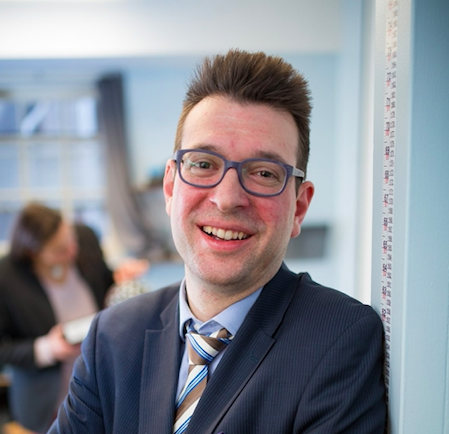Editor’s note: Startup Spotlight is a regular feature at WRAL TechWire, brining attention to emerging entrepreneurial venutres in North Carolina’s innovation economy.
+++
CHAPEL HILL – Between the pandemic, international unrest, natural disasters and the mounting underlying pressures of daily life, the challenges of mental health and mental illness are surfacing more than ever. According to the National Alliance on Mental Illness, more than one in five adults in the U.S. experience mental illness, and more than one in 15 experienced both a substance abuse disorder and mental illness. For those seeking treatment, solutions can be limited and unaffordable on a personal level – and unable to scale to meet the growing mental health needs across society at large.
Pulvinar Neuro, a UNC-Chapel Hill spinout company, offers a novel device that shifts brain activity patterns for patients suffering from mental illness and substance abuse. Founded by Dr. Flavio Frohlich, professor of psychiatry and director of the Carolina Center for Neurostimulation in the Department of Psychiatry at the UNC School of Medicine, the company developed a breakthrough technology that has caught the attention of industry leaders and investors alike. Pulvinar Neuro has worked with Innovate Carolina – the University’s central team that provides strategic guidance and practical tools for innovation and entrepreneurship on campus and in the community – over the past five years. In March 2022, the company was acquired by Electromedical Products International, Inc. (EPI), a leading medical device company that uses patented, FDA-cleared non-invasive brain stimulation technology to treat anxiety, insomnia, depression, and pain. Pulvinar’s approach uses a device that delivers high-quality, non-invasive brain stimulation: transcranial alternating current stimulation (tACS).
“Our goal is to translate our proprietary non-invasive brain stimulation technology into the clinic, which will have a transformative impact on patients’ lives,” says Dr. Leah Townsend, CEO of Pulvinar Neuro who earned dual bachelor’s degrees and a doctoral degree in neuroscience from UNC-Chapel Hill. “Like EPI, we’re bringing hope to patients and their families who otherwise might not be aware of the benefits of brain stimulation.”
Known for his pioneering work in discovering that brain activity can be targeted, Frohlich is on a mission to transform how psychiatric illnesses are treated.
“About 10 years ago, I had discovered that the electric fields generated by the brain act as a feedback signal to enhance brain rhythms,” says Frohlich. “Our team has worked hard to translate this discovery into the next generation brain stimulation for delivering electricity to the brain that is adjusted in response to measured brain activity. What I am most excited about is bringing this technology to patients and creating a new way of treating psychiatric illnesses that will change lives.”

Leah Townsend, Ph.D., CEO, Pulvinar Neuro. (UNC-CH photo)
The company was founded by Frohlich and launched in 2016 with the support of Kickstart Venture Services. Pulvinar Neuro is one of the original companies launched through KickStart, a department in Innovate Carolina’s Office of Technology Commercialization (OTC) that supports research-based startup formation and growth by providing education, early-stage funding and on-campus accelerator space. Pulvinar also worked with OTC’s commercialization team throughout the patent process and, ultimately, the company acquisition.
In 2016, Pulvinar Neuro received funding from the KickStart Grant-Awards Program, which helps early-stage companies meet commercial milestones, either on the technical side (prototype development, animal studies) or on the business side (regulatory pathway, market opportunity). Requests for proposals (RFAs) are solicited on a quarterly basis from faculty founders and are in the $5,000 to $50,000 range, depending the on the company’s needs. The program also provides funding and access to internal and external business experts to assist faculty with the commercial translation of concepts for novel therapeutic small molecules, biologics, diagnostics, devices or digital health.
“I met Flavio in 2016, not long after I moved to RTP and had the opportunity to see one of the early prototypes of his non-invasive brain stimulation devices,” says Mireya McKee, Ph.D., director of KickStart Venture Services. “I remember thinking the technology sounded incredibly exciting and it could potentially lead to novel and disruptive ways of treating mental health disorders. However, as is the case with many early-stage inventions, it had some ways to go before it could be at a stage where it could raise funding or be used in a clinical setting. The KickStart Grant Award allowed them to work with an electronics manufacturing services firm to develop and build a professional-looking, commercial version of the device for researchers: the XCSITE 100. It also enabled them to introduce the product to the research community at relevant scientific events, where they had their first sales.”
“Without Kickstart Venture Services, I don’t think there would be a Pulvinar,” says Townsend. “They really helped bootstrap the company and were instrumental in helping the company get started.”
“KickStart also supported the company with a fellowship for a former graduate student from the Frohlich Lab who led their early product development as well as connected them with service providers and talent from our network of advisors and entrepreneurs, including Leah, who played a tremendous role in moving the company forward,” adds McKee. “It is truly delightful to see Pulvinar’s ongoing success. I am certain the partnership with EPI will help accelerate clinical applications of the technology and lead to treatment of many psychiatric and neurological illnesses.”
Pulvinar Neuro’s recent acquisition by EPI means that the startup’s technology can take a big step forward toward achieving Frohlich and Townsend’s ultimate goal: improving the mental health of patients. The resources of EPI will bolster the company’s efforts to build a product that will scale for clinical trials and hopefully receive FDA approval for a variety of mental health conditions.
“Our mission hasn’t changed,” says Townsend. “EPI has been the market leader for decades in non-invasive brain stimulation for the treatment of anxiety, insomnia, depression, and pain. Becoming part of the EPI corporate team allows us to focus on what we’re good at doing, which is developing really innovative cutting-edge technology, and then EPI will help translate that technology into the clinic and for home use.”
“I am incredibly excited for this opportunity to accelerate the process of getting our brain stimulation solution to market,” Frohlich says. “EPI has FDA-cleared technology already in the market and brings decades of experience in the field to the table. It is a dream come true to see what started in our research lab in the Department of Psychiatry move so quickly towards clinical use.”
Dr. Samantha Meltzer-Brody, Assad Meymandi Distinguished Professor and Chair of the Department of Psychiatry at UNC, states that “Dr. Frohlich’s work is transformative for our field, which desperately needs new treatment options given the mental health crisis we face. Dr. Frohlich is leading the way in developing novel and highly impactful solutions for psychiatric illness. His research program is outstanding and an inspiring model of innovation and translational science for the UNC Department of Psychiatry and School of Medicine.”

Flavio Frohlich, Ph.D., associate professor, UNC Neuroscience Center. (UNC-CH photo)
“I’ve worked with Flavio and Leah for a few years, and in that time I have been provided the opportunity to learn more about the research behind Pulvinar’s technology and have gained an appreciation for what it has taken Pulvinar to get to where they are today,” says Matt Howe, PhD, commercialization manager with OTC. “When I learned of the acquisition, I was excited about what this opportunity would mean for Pulvinar and was able to work with Leah throughout the process. The acquisition is a great step forward for the Pulvinar team to continue development of their technology and achieve the goal of providing a novel treatment for patients with mental illness.”
Townsend sees the acquisition as transformative for Pulvinar Neuro, as it opens doors and opportunities for additional resources that larger companies bring.
“As a startup, it’s always very risky. You only really get one shot on goal, and you need to maximize your chance of getting a slam dunk,” she adds. “For us, this is that slam dunk. EPI has an established relationship with the FDA, an established sales force, infrastructure and the benefit of commercializing its patented brain stimulation devices for decades. And so we can tap into that expertise to develop our technology and our products, which maximizes our chance to get into the clinic and have a treatment that will be prescribed for patients.”
The growth of Pulvinar Neuro adds to the number of startups flourishing across the region. Townsend is energized not only about the future of Pulvinar Neuro, but also about the growing reputation of the University, Town of Chapel Hill and the Research Triangle region of North Carolina as an emerging startup hub.
“There’s been this tremendous development of the local ecosystem for startups,” she adds. “I think the success of any one startup requires that ecosystem to thrive, and I’m really excited about all the ways that Innovate Carolina and the University are helping to support that ecosystem by keeping startups plugged in so they have what they need to be successful. Investors and key partners are now interested in RTP, and Carolina is a huge part of that. It really takes a village to get startups up and running and mature into an investable or acquirable company. Over the years, it feels like Pulvinar really benefited from that.”
While Pulvinar Neuro’s technology could ultimately be used for multiple indications, the company is currently focused on depression and substance use disorder. Finding treatments for these conditions drives Townsend in the work she does every day.
“We have some mental illness in my family that medications weren’t able to help with, and unfortunately had really bad outcomes,” she says. “So the idea of bringing a non-pharmacological treatment option that works through a different mechanism is exciting. For those patients who do not get symptom relief from medication or are not able to take medication due to side-effects, to have an evidence-based, alternative treatment that functions completely differently… if nothing else, that offers hope.”
For more information about Pulvinar Neuro, visit its website at pulvinarneuro.com.
(C) UNC-CH





























